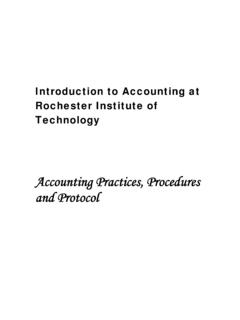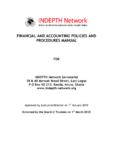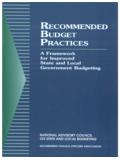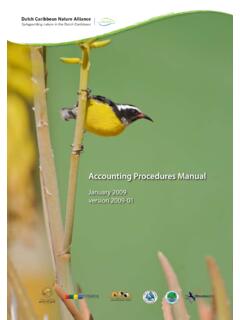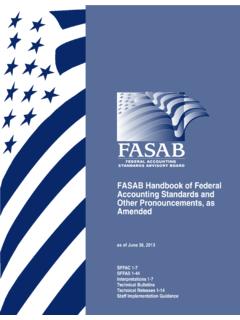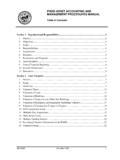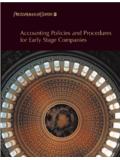Transcription of XIV. Accounting for Gifts, Endowment Earnings …
1 XIV. Accounting for Gifts, Endowment Earnings and other Projects A. Overview: RIT receives gifts and other income to support the operations of the University. Gifts that are restricted for use by the donor are deposited into separate project accounts in the general ledger. Objectives: In this chapter you will learn about: what gifts are and why they re important to RIT the role of the Development Office in Accounting for gifts the different types of restricted projects how new projects are set up in the general ledger how project expenditures are monitored how deficit account balances are resolved B. What Gifts Are and Why They Are Important to RIT 1. Gifts are defined as funds received from external sources that are donative in nature. They are bestowed voluntarily ( , the intent of a gift is philanthropic) and without the expectation of any compensation . In other words, the donor does not receive goods or services in exchange for donations made to the University.
2 2. While tuition paid by students is the major source of income to the University, gifts are important for a variety of reasons. gift income supplements RIT s budget by providing additional funds to award scholarships to students, maintain the infrastructure, and grow the University s Endowment . 3. Gifts are donated to RIT from various sources outside of the Institute such as trustees, faculty/staff, alumni and friends, corporations, and foundations. 4. When RIT receives a gift , and there are no restrictions on how it may be spent, it is called an unrestricted gift and the funds may be used for any business purpose. However, donors often place restrictions on how the funds they donate may be spent by the University. a. Temporarily Restricted When a donor specifies how he/she wants the funds donated to RIT to be spent, the gift is referred to as temporarily restricted . The Development Office, the Controller s Office, and the department receiving the gift are jointly responsible for ensuring that the gift is spent according to the donor s wishes Introduction to Accounting at Rochester Institute of Technology: RIT Accounting practices , procedures and Protocol Chapter XIV: Accounting for Gifts Revised: September 1, 2008 1(see Sections J L for more information about temporarily restricted gifts).
3 B. Permanently Restricted When a donor specifies that a gift be endowed ( , invested in the University s Endowment fund in perpetuity); it is called a permanently restricted gift . Only a portion of the annual investment Earnings from endowed gift may be spent according to the donor s specific restriction (see Section L for more information about Endowment Earnings accounts). 5. In addition to outright gifts of cash, RIT receives pledges, gifts-in-kind, securities, bequests and deferred gifts. Definitions of each type of gift are as follows: a. Pledges A documented commitment to RIT to receive future charitable contributions from employees, other individuals, companies or foundations. The details required in order to record a pledge include the donor s signature, the pledge amount, payment schedule, and the designation, if any. b. Gifts-in Kind Non-cash gifts, or gifts of non-monetary items of tangible property such art, equipment, consumables and real estate. The donor must provide information about the valuation and how it was determined before it can be recorded as a charitable gift (see Section E for more information regarding gifts-in-kind).
4 C. Securities Publicly traded and closely held securities (stocks) and bonds may be donated by delivering the fully executed securities (stock certificate or bonds) to RIT or by transferring the securities electronically through the brokerage firm(s) of the donor and RIT. d. Bequests An individual s charitable contribution from their estate at the time of their death. RIT records bequest intentions if the donor has provided a copy of his/her will or excerpt from the will and/or letter from the donor s attorney or financial advisor. There are several types of bequests or deferred gifts and many have tax benefits for the donors. Donors e. Deferred Gifts The benefit of a gift to RIT is not actually realized until some point in the future. Due to the uncertainty of timing of the realization of the gifts, they are reported at present value, separately from outright gifts. Deferred gifts are only recorded in the general ledger when the donor irrevocably establishes the instrument.
5 Examples of deferred gifts include charitable gift annuities, charitable lead trusts, charitable remainder trusts, and life estates. f. Matching Gifts Gifts made to RIT from companies/foundations that have agreed to match charitable contributions made by their employees or trustees. The Development Office processes Corporate matching gift applications so that a matching claim is created and both the corporation and employee are properly recognized. Introduction to Accounting at Rochester Institute of Technology: RIT Accounting practices , procedures and Protocol Chapter XIV: Accounting for Gifts Revised: September 1, 2008 2C. The Role of the Development Office 1. The Office of Development RIT and Alumni Relations is the official fund raising organization of RIT. All gifts, received as cash, check, money order or gift -in-kind are deposited by the Development Office. This will ensure that each donor receives a formal receipt (for tax purposes), an accurate donor history is maintained centrally for the Institute, and that charitable gifts are properly handled as required by RIT for auditing purposes.
6 2. The Development Office engages in a variety of fundraising activities designed to increase the number of gifts made to the University including: a. Capital Campaigns are a method for non-profits (largely colleges and universities) to identify a comprehensive needs list and position the organization to solicit numerous major gifts and multi-year commitments. The length of a campaign is generally six years or more. RIT is currently in a $300 million campaign that began June 15, 1998 and concludes June 30, 2006. In the height of this campaign, RIT s three-year average for gift activity is $45 million. b. Major Gifts represent donations by any individual, corporation or other entity above $25,000. They are often solicited by a team and can involve staff and administration including the President, the Provost, Vice Presidents, Deans, Development Officers and faculty. Major gifts are often fulfilled through multi-year pledges, deferred commitments, and/or gifts of securities. c.
7 Annual Fund activity consists of all gifts not at the major gift level and generally obtained through telefund and direct mail solicitations. Annual Fund gifts fulfill the Institute s urgent operational needs and are often unrestricted and designated toward scholarships or use by specific colleges. The greatest source of Annual Fund giving is from trustees, alumni, faculty/staff and parents. d. RIT Alumni (an individual holding a certified RIT degree) play a critical role in raising philanthropic funds either through personal donations or by providing connections to other sources of gifts. The Alumni Relations Office serves as the Institute s official point of contact for engaging and fostering alumni relationships. Alumni participation is also important in fund raising. The opportunity to receive high national rankings, grants or foundation support is impacted by RIT s ability to garner alumni participation. 3. Donor Relations a. The University recognizes donors personally and publicly.
8 In addition to personal recognition through correspondence and gift receipts, an annual donor report is published each November as a supplement to the University Magazine. Introduction to Accounting at Rochester Institute of Technology: RIT Accounting practices , procedures and Protocol Chapter XIV: Accounting for Gifts Revised: September 1, 2008 3b. Donors receive official tax documents for their gifts within 36 hours of receipt by the Development Office. The President, appropriate Vice President, Dean and/or Development Officer personally acknowledge gifts above $500. Aside from these acknowledgments, donors may also receive recognition through naming opportunities and campus donor walls. For more information, refer to the Donor Bill of Rights in Chapter XVI, Section E. D. Accounting for Gifts 1. To ensure accurate gift reporting and prompt donor acknowledgements, departments are asked to forward all gifts they receive directly from donors to the Development Office for processing.
9 A. When a department makes a gift deposit at the Cashier s Office, Accounting will post the deposit to a general ledger suspense account, not to the gift account entered on the Deposit ID Form. b. Once the department provides documentation to the Development Office, the Campaign and Financial Reporting Specialist will prepare a journal entry to move the funds to correct gift account. This step ensures that gifts received by departments are accounted for correctly on the general ledger. 2. Recording Gifts a. The Advance Fundraising application is the University s official database for recording, storing and managing alumni records and donor gift transactions. The system holds 90,000 alumni records and 110,000 other records. Functionality includes biographical and address management, donor stewardship, and donor giving histories. b. When a deposit is prepared by Development, both the Advance system and the General Ledger are updated. When Accounting processes the deposit journal entry, the appropriate gift account is credited (see Sections F through L below for more information).
10 C. Staff in the Controller s Office reconcile the gifts that have been recorded in the Development Advance System to the general ledger. There may be differences in the amount recorded due to requirements by Case Management Reporting Standards (CASE Council for Advancement and Support of Education) vs. GAAP (Generally Accepted Accounting Principles). 3. Critical gift Reporting Times a. Fiscal Year-End It is important to ensure that all gifts received on or before June 30th of each year are reflected in the University s financial statements. Introduction to Accounting at Rochester Institute of Technology: RIT Accounting practices , procedures and Protocol Chapter XIV: Accounting for Gifts Revised: September 1, 2008 4b. Calendar Year-End For income tax purposes, many donors make charitable donations on or before December 31st. The Development Office is open during the Institute s holiday break to process and receipt year-end gifts for donors tax requirements. E. Accounting for Gifts-in-Kind 1.
